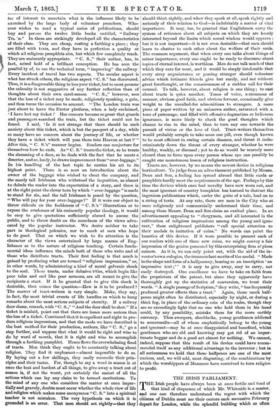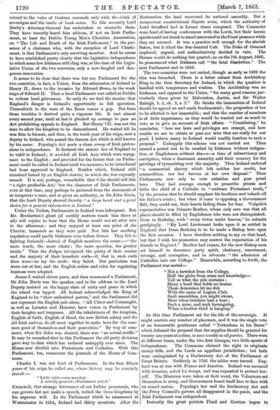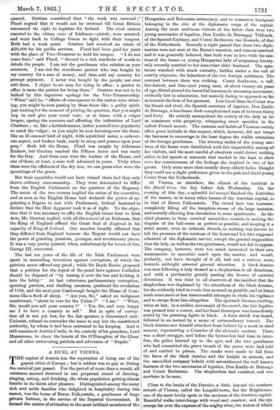THE IRISH PARLIAMENT.
THE Irish people have always been at once fertile and fond of I. that kind of eloquence of which Mr. Whiteside is a master, and one can therefore understand the regret with which the citizens of Dublin must see their orators each successive February depart for London, while the splendid building which so often
echoed to the voice of Grattan resounds only with the chink of sovereigns and the rustle of bank-notes. To this necessity Lord Derby's Attorney-General has undertaken to reconcile them. They have recently heard him address, if not an Irish Parlia- ment, at least the Dublin Young Men's Christian Association, on "The Life and Death of the Irish Parliament," in the pre- sence of a chairman who, with the exception of Lord Cherie- mont, is that Parliament's only surviving member. And he seems to have established pretty clearly that the legislative independence to which some few Irishmen still cling was, at the time of the Legis- lative Union of the two countries, only a new-fangled and dan- gerous innovation.
It seems to be clear that there was but one Parliament for the two countries, in fact, a Union, from the submission of Ireland to Henry IL, down to the invasion by Edward Bruce, in the weak reign of Edward H. Then a local Parliament was called at Dublin to redress local grievances. So early do we find the maxim that England's danger is Ireland's opportunity in full operation. Thenceforth to the wars of the Roses comes a gap. But from those troubles it derived quite a vigorous life. It met almost every second year, until at last it plucked up courage to pass an Act prohibiting appeals to England. But Henry VII. was not the man to allow his kingdom to be dismembered. He waited till he was firm in his seat, and then, in the tenth year of his reign, sent a deputy to Ireland, who passed the famous Act which is still known by his name. Poyning's Act made a clean sweep of Irish preten- sions to independence. It declared the statute law of England to be valid in Ireland ; it avoided all Irish Acts which were repug- nant to the English ; and provided for the future that no Parlia- ment could be called in Ireland until the measured to be introduced had been approved in England. Besides which, Ireland still remained bound by an English statute, in which she was expressly named. It is not, perhaps, remarkable that Coke should call this " a right profitable Act," but the character of Irish Parliaments, even at that time, may perhaps be gathered from the statement of so temperate a man, and so great an authority, as Sir John Davis, that the Lord Deputy showed thereby " a large heart and a great desire for a general reformation in Ireland."
Under the Tudors, Parliaments in Ireland were infrequent. But Mr. Brotherton's ghost (if earthly matters touch him there at all) will rejoice to hear that the House would not sit after two in the afternoon : and they enjoyed at least one point of the Charter, inasmuch as they were paid. Not this last soothing regulation could pacify Irishmen even before dinner. They fell to fighting furiously—hatred of English members the cause ;—" the more words, the more choler ; the more speeches, the greater broils." Then the Judges interposed the purity of their ermine and the majesty of their horsehair curls—if, that is, such curls then were—to lay the strife : they failed. But patriotism was worn out at last, and the English orders and rules for regulating business were adopted.
James I. waited eleven years, and then summoned a Parliament, Sir John Davis was the speaker, and in his address to the Lord Deputy insisted on the happy state of unity and peace in which the island was lapped. All Ireland acknowledged the King of England to be "their undoubted patron," and the Parliament did not represent the English pale alone. "All Ulster and Connaught, as well as Leinster and Munster, have voices in Parliament by their knights and burgesses. All the inhabitants of the kingdom, English of birth, English of blood, the new British colony and the old Irish natives, do all meet together to make laws for the com- mon good of themselves and their posterities." By way of com- ment, when Sir John was chaired, there was " an actual scuffle."
It may be remarked that in this Parliament the old party divisions gave way to that which has endured unhappily ever since. The House now divided into Protestants and Catholics. With this Parliament, too, commence the journals of the House of Com- mons.
Charles I. was not fond of Parliaments. In the first fifteen years of his reign he called one, whose history may be concisely stated :— "Little said—soon mended:
A subsidy granted—Parliament ended."
Cromwell, that strange forerunner of our Indian proconsuls, who can govern but not make a speech, united the three kingdoms by his supreme will. In the Parliament which he summoned at Westminster in 1654, Ireland had thirty members. After the Restoration the land recovered its national assembly. But a momentous constitutional dispute arose, which the authority of Lord Strafford had in former times composed. The Commons were fond of having conferences with the Lords, but their heroic spirits could not brook to stand uncovered in the Peers' presence while they sat covered. It was a practice well enough for the slavish Saxon, but it irked the free-hearted Celt. The Duke of Ormond implored, argued, and authoritatively decided in vain. The Houses would do nothing but quarrel ; so on the 7th August, 1666, he pronounced what Irishmen call " the fatal dissolution." The next Parliament met in 1692.
The two countries were not united, though as early as 1699 the idea was broached. There is a letter extant from Archbishop King to the then Secretary for Ireland, in which the question is handled with temperance and wisdom. The Archbishop was an Irishman, and opposed to the Union, " for many good reasons, par- ticularly those given by Malvezzion, Jactus, and Sir Walter Raleigh, b. 5, ch. 2, a. 2." He thinks the immunities of Ireland should be agreed on and made fundamental ; the proportion of tax to be allotted to her immutable ; and that the number of members is of little importance, as they would be wanted not so much to vote as to give an account of Irish affairs. " Considering," he concludes, " how our laws and privileges are crampt, and how unable we are to obtain or pass our laws that are really for our good, I believe many in Ireland would readily hearken to such a proposal." Unhappily this scheme was not carried out. Then ensued a period not to be recalled by Irishmen without indigna- tion, or Englishmen without shame—a time of subserviency and corruption, when a dominant minority sold their country for the privilege of tyrannizing over the majority. Then Ireland endured "a commercial slavery which left neither her credit, her commodities, nor her havens at her own disposal." Then Parliaments met only to vote subsidies and pass penal laws. They had courage enough to proscribe priests and bribe the child of a Catholic to " embrace Protestant truth," by the promise that he should supplant his brethren and inherit all his father's estate ; but when it came to opposing a Government Bill, they could not, their hearts failing them for fear. Walpole's representative was Primate Boulter, whose only care was that all places should be filled by Englishmen who were not distinguished. Even to Berkeley, with " every virtue under heaven," he submits grudgingly. " My Lord Lieutenant looks upon it as settled in England that Dean Berkeley is to be made a Bishop here upon the first occasion. I have therefore nothing to say on that head, but that I wish his promotion may answer the expectation of his friends in England." Boulter had reason, for the new Bishop soon set himself to denounce party spirit, obstinacy, resentment, revenge, and corruption, and to advocate " the admission of Catholics into our College." Meanwhile, according to Swift, the Parliament was seated- " Not a bowshot from the College,
Half the globe from sense and knowledge—
Tell us what the pile contains : Many a head that holds no brains.
These demoniacs let me dub With the name of Legion Club.
Such assemblies, you might swear, Meet when butchers bait a bear ; Such a noise, and such haranguing, When a brother thief is hanging."
At this time Parliament sat for the life of the sovereign. It might contain any number of placemen, and it was the single vote of an honourable gentleman called " Tottenham in his Boots" which defeated the proposal that the supplies should be granted for twenty-one years at a time, to save trouble to all parties. There were at different times, under the two first Georges, two little spurts of independence. The Commons claimed the right to originate money-bills, and the Lords an appellate jurisdiction ; but both were extinguished by a Declaratory Act of the Parliament of Great Britain. Suddenly in 1781 the tables were turned. Eng- land was at war with France and America. Ireland was menaced with invasion, asked for troops, and was requested to protect her- self. The Ministers were taken at their word, the Volunteers set themselves in array, and Government found itself face to face with an armed nation. Poyning's law and the Declaratory Act and the Privy Council's powers all disappeared in the panic, and the Irish Parliament was independent.
Instantly the great patriots Flood and Grattan began to
quarrel. Grattan considered that " the work was crowned ;" Flood argued that it would not be crowned till Great Britain renounced the right to legislate for Ireland. The rival orators resorted to the ultima ratio of Irishmen—pistols ; were arrested, and went back to College Green to fight with their tongues. Both had a weak point. Grattan had received an estate of £50,000 for his public services. Flood had been paid for years with the place of Vice-Treasurer to hold his tongue. " I do not come here," said Flood, " dressed in a rich wardrobe of words to delude the people. I am not the gentleman who subsists on your accounts. I am not the mendicant patriot who was bought by my country for a sum of money, and then sold my country for prompt payment. I never was bought by the people, nor ever sold them. I object to no man for being in office: a patriot in office is more the patriot for being there." Grattan was not to be balked by this ingenious apology for the Vice-Treasurership. " When" said he, " affairs of consequence to the nation were debat- ing, you might be seen passing by these doors like a guilty spirit, just waiting for the moment of putting the question, that you might hop in and give your venal vote ; or at times, with a vulgar brogue, apeing the manners and affecting the infirmities of Lord Chatham ; or, like a kettledrummer, lather yourself into popularity to catch the vulgar ; or you might be seen hovering over the dome, like an ill-omened bird of night, with sepulchral notes, a cadaver- ous aspect, and broken beak, ready to stoop and pounce upon your prey." Both left the House. Flood was caught by Alderman Exshaw, but Grattan reached the Fifteen Acres and was ready for the fray. And these men were the leaders of the House, and one of them, at least, a man well advanced in years. Truly when these were the offshoots of the dry tree, we can guess what were the sproutings of the green.
But their squabbles would not have ruined them had they only shown ordinary statesmanship. They were determined to differ from the English Parliament on the question of the Regency. The union of the two crowns implied the union of the executive, and as soon as the English House had declared the power of ap- pointing a Regent to rest with Parliament, Ireland hastened to declare that the Heir Apparent took it as of right. To the objec- tion that it was necessary to affix the English Great Seal to Irish Acts, Mr. Grattan replied, with all the naiveté of an Irishman, that the King of England affixed the Great Seal of England in his capacity of King of Ireland. One member broadly affirmed that they differed from England because the Regent would not have the power of granting pensions, peerages, and reversionary places. It was a very pretty quarrel, when, unfortunately for lovers of fun, George III. recovered.
The last ten years of the life of the Irish Parliament were spent in unavailing invectives against corruption, of which the patriots never offered any proof ; while Sir Boyle Roche proposed that a petition for the repeal of the penal laws against Catholics should be disposed of "by tossing it over the bar and kicking it into the lobby." At last volunteers, parliamentary corruption, spouting patriots, and duelling senators, produced the revolution of 1798, and the next year Castlereagh bought the House of Com- mons like a flock of sheep. " Are you, Sir," asked an indignant constituent, " about to vote for the Union ?" " I am." " What, Sir, would you sell your country ?" " Yes, Sir, and very happy am I to have a country to sell " But in spite of corrup • tion all is not yet lost, for the Last speaker, a determined anti- Unionist, refused to surrender the mace to any but the constituted authority, by whom it had been entrusted to his keeping. And it still remains at Antrim Castle, in the custody of his grandson, Lord Aisssareene, to cheer the hearts of the O'Donoghue of the Glens and all other unwavering patriots and advocates of " Repale."




























































 Previous page
Previous page